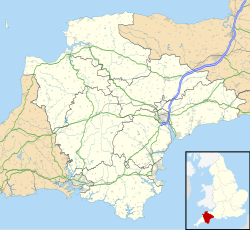| Cudlipptown | |
|---|---|
 A lane in Cudlipptown | |
Location within Devon | |
| OS grid reference | SX525785 |
| District | |
| Shire county | |
| Region | |
| Country | England |
| Sovereign state | United Kingdom |
| Post town | TAVISTOCK |
| Postcode district | PL19 |
| Dialling code | 01822 |
| Police | Devon and Cornwall |
| Fire | Devon and Somerset |
| Ambulance | South Western |
| UK Parliament | |
Cudlipptown or Cudliptown is a small village located near the western edge of Dartmoor National Park, northeast of Tavistock, and approximately one mile northeast of Peter Tavy.
The village comprises a few houses, with a post box embedded in the front garden wall of one of the houses. A 15th-century inn, the Peter Tavy Inn, is found in the village of Peter Tavy nearby. [1]
